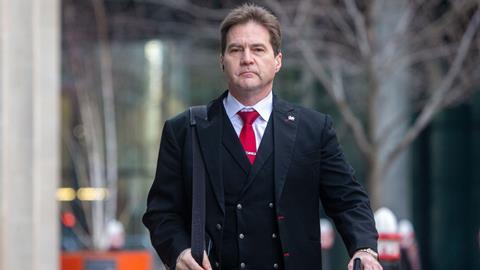The High Court judge who demolished crypto-entrepreneur Dr Craig Wright’s claim to have invented bitcoin has emphatically rejected a bid by Wright to be allowed to give evidence remotely at a subsequent contempt hearing. Australian-born Wright, now believed to be in East Asia, faces allegations that he is in contempt for breaching an injunction following this year’s ruling that his claim to be ‘Satoshi Nakamoto’ was false.
Read more
In his latest addition to a volumnious set of rulings in Crypto Open Patent Alliance v Dr Craig Steven Wright, Mr Justice Mellor deals with issues arising from an application by COPA, a group of software developers, relating to Wright’s behaviour following the so-called 'identity trial' ruling. According to the judgment, Wright is seeking £911bn in damages against ‘a large number of defendants’. COPA argues that this threat is in breach of injunctive relief granted last summer.
At a case management conference last month, Wright argued that he should be permitted to attend the forthcoming application hearing remotely by video link. He also alleged that the judge had shown ‘apparent bias’.
On the application for remote attendance, Wright cited ‘severe threats’ to his safety, 'challenges posed by his autism spectrum disorder (ASD)' and 'procedural fairness obligations'.
Mellor pointed to the 'strong presumption in favour of personal attendance at a contempt hearing'. After reviewing Wright’s threats claims 'with care' he concluded that they did not appear to amount to a serious threat to Wright’s personal safety. He dismissed Wright’s claim to have spent £50,000 a day on bodyguards during the identity trial, which he could no longer afford, as 'significantly embellished' or 'more likely to be pure invention'. He advised that 'a taxi to court provides a convenient and anonymous way to get to the relevant court building'.
On Wright’s ASD claim, the judge observed that Wright had 'given evidence in multiple legal actions without it ever being suggested by any of his impressive legal teams that his ASD condition meant that he should attend remotely'.
On other possible factors, the judge said that Wright should not fear arrest on arrival in the UK as a planned referral to the Crown Prosecution Service for perjury and forgery would not take place until after the contempt hearing.
He rejected the insinuation of bias, which he said had already been dealt with by Lord Justice Arnold following an application by Wright for permission to appeal.
Jonathan Hough KC and Jonathan Moss, instructed by Bird & Bird LLP, appeared for COPA; Dr Craig Wright appeared in person, by remote link




























8 Readers' comments